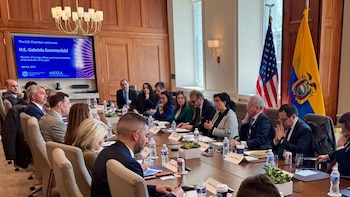
Ukrainian President Volodymyr Zelensky refused to receive a visit to Kiev by his German counterpart, Frank-Walter Steinmeier, because of his links to the German-Russian gas pipeline Nord Stream, the mainstay of Moscow's current German energy dependency.
Steinmeier intended to travel to the Ukrainian capital together with Polish President Andrzej Duda, according to reports from the German daily Bild.
The idea had come from Duda, who wanted to add to the mission the presidents of the Baltic countries, and it had to be realized today, during the German president's official visit to Warsaw.
However, according to that newspaper, Zelensky declined to receive him because of Steinmeier's past links with the construction of that gas pipeline.

The German president himself acknowledged a few weeks ago his “error” of appreciation, for having defended in his time as minister the need to carry out this project.
Steinmeier was Minister of the Chancellery under the Social Democrat Gerhard Schröder, between 1999 and 2005, and then head of Foreign Affairs of the conservative Angela Merkel, between 2005 and 2009 and also between 2013 and 2017.
In their first term, then-Chancellor Schröder and his political ally, Russian President Vladimir Putin, signed the agreement for the construction of the first gas pipeline, which became operational in 2011. This agreement was sealed in 2005, a few months before Schröder left power, who then headed the Nord-Stream council, a position he still holds.
In 2011, after the first gas pipeline became operational, it was agreed to build the Nord Stream 2 to increase the direct transport of Russian gas to Germany via the Baltic. That second project was kept standing by the decision of Merkel and her then partners, the Steinmeier Social Democrats, despite the annexation of Crimea in 2014.
The current chancellor, the Social Democrat Olaf Scholz, suspended the license for the start-up of the second gas pipeline following the Russian invasion of Ukraine, on 24 February. However, it rejects an immediate embargo on gas imports from Russia because of its heavy energy dependence on Moscow.
Both Ukraine and Poland have criticized this German position, for which they hold both Schröder, as the driver of the agreement, and Merkel, responsible for extending it, and Scholz, for not deciding to break those ties.
(With information from EFE)
Keep reading:
Últimas Noticias
Debanhi Escobar: they secured the motel where she was found lifeless in a cistern
Members of the Specialized Prosecutor's Office in Nuevo León secured the Nueva Castilla Motel as part of the investigations into the case

The oldest person in the world died at the age of 119
Kane Tanaka lived in Japan. She was born six months earlier than George Orwell, the same year that the Wright brothers first flew, and Marie Curie became the first woman to win a Nobel Prize

Macabre find in CDMX: they left a body bagged and tied in a taxi
The body was left in the back seats of the car. It was covered with black bags and tied with industrial tape
The eagles of America will face Manchester City in a duel of legends. Here are the details
The top Mexican football champion will play a match with Pep Guardiola's squad in the Lone Star Cup

Why is it good to bring dogs out to know the world when they are puppies
A so-called protection against the spread of diseases threatens the integral development of dogs




